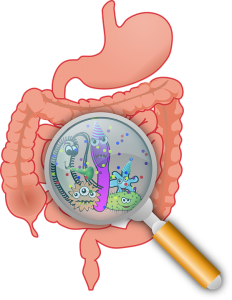High-Intensity Exercise Boosts Healthy Gut Probiotics

Exercise boosts healthy bacteria in the gut..
The composition of our gut bacteria affects our digestive health and our overall health. Our probiotic bacteria is also linked to our moods and far-ranging diseases including diabetes. Now we find that exercising actually benefits our gut bacteria by boosting our probiotics.
This, of course, opens up a brand new paradigm for those who have been looking for new ways to increase their healthy colonies of probiotics.
In this article
Six weeks of exercise tested
Researchers from the University of Illinois tested 32 people who did not work out. This is typically referred to as being sedentary.
Of the 32 people, 18 were lean and 14 were obese. The researchers began the study by testing everyone’s gut microbial populations. Gut microbes are measured by testing stool samples.
Then the researchers supervised a six-week exercise program for each of the volunteers.
The exercise program was a fairly intense endurance regimen. It ranged from moderate intensity to vigorous intensity workouts for three days a week. The intensity was regulated by measuring heart rates. Moderate activity was 60 percent of heart rate reserve and vigorous was 75 percent of heart rate reserve.
Such an exercise routine would be considered a high-intensity exercise program.
Everyone underwent between a half-hour to an hour of this exercise program, which worked out to practically every other day.
At the end of the six-week exercise program, the researchers tested the gut microbes of the volunteers again.
After this, the volunteers returned to their sedentary lifestyles for another six weeks. Gut microbes were again tested after this period.
The researchers made sure that the diets of the volunteers remained the same throughout the exercise phase and the sedentary phase of the study. On top of this, each test included a three-day diet watch to make sure there were no significant diet changes.
Gut bacteria changed despite diet among the lean
The researchers found that the six weeks of exercise increased healthier populations of gut bacteria among the lean volunteers. These changes were regardless of the types of diets the volunteers had.
These were probiotic colonies that produced increased amounts of what are called short-chain fatty acids, or SCFAs.
What are short chain fatty acids?
SCFAs are byproducts that are produced by certain species of probiotic bacteria. SCFAs are anti-inflammatory compounds that benefit our health in a number of ways.
This is a significant point because SCFAs are important for the health of our gut. Low levels of SCFA-producing bacteria have been linked with colorectal cancers, inflammatory bowel diseases such as IBS and colitis.
Low levels of SCFAs have also been linked to higher levels of the “bad” cholesterol, which of course is linked to cardiovascular disease.
Why didn’t the exercise benefit the overweight people?
This is currently unknown, but there are a number of possible explanations. One may be related to the fact that high-fat diets tend to reduce the number of healthy bacteria in the gut. This understanding has come after a number of studies on animals and humans have found that high-fat diets tend to depress counts of good bacteria.
While the type of diet didn’t affect the benefits among the lean group, perhaps there is a combined effect of inflammation.
In other words, there may be a depression of good bacteria simply because overweight people tend to have higher levels of inflammation. There have also been studies showing a link between inflammation and certain types of bacteria.
Stopping exercise decreases good bacteria populations
The researchers also found that when the test subjects returned to their sedentary lifestyles for another six weeks, they lost the microbial benefits of the exercise. Their exercise period improved their gut microbes, and the lack of exercise during the next six weeks blew a hole in that benefit.
The benefit didn’t reverse altogether mind you. But most of it did. Logically, continued sedentary lifestyles over more time would reverse the rest of the benefit gained from the six weeks of exercise.
Research supported by other studies
This human study follows a number of studies that have found this same effect in mice. The researchers of this human study also conducted a similar study among mice before this. And we find studies over a three-year period that have confirmed this effect among mice.
This study was designed for moderate to vigorous exercise specifically because the mice studies have also shown that high-intensity exercise tends to have the greatest effect on the gut’s bacteria profile.
Exercise benefits underestimated
High-intensity exercise is good for your body. And there is a good reason to now believe that the old premises for why exercise is healthy were incomplete.
For example: Yes, exercise benefits the heart and arteries, but not only because the heart is being pumped more and the arteries are being expanded and relaxed faster. The benefits to the heart and arteries also relate to the intestines producing less pro-inflammatory byproducts and more anti-inflammatory byproducts such as short-chain fatty acids.
And increasing anti-inflammatory byproducts means increasing populations of good bacteria – probiotics – in our guts.
Still, we should be careful that our exercise is not over-exertion. This could be problematic for other reasons.
REFERENCES:
Allen JM, Mailing LJ, Niemiro GM, Moore R, Cook MD, White BA, Holscher HD, Woods JA. Exercise Alters Gut Microbiota Composition and Function in Lean and Obese Humans. Med Sci Sports Exerc. 2017 Nov 20. doi: 10.1249/MSS.0000000000001495.
Yates D. Exercise changes gut microbial composition independent of diet, team reports. Illinois Research News. Dec. 4, 2017.
Murphy EA, Velazquez KT, Herbert KM. Influence of high-fat diet on gut microbiota: a driving force for chronic disease risk. Curr Opin Clin Nutr Metab Care. 2015 Sep;18(5):515-20. doi: 10.1097/MCO.0000000000000209.
Wang N, Liu Y, Ma Y, Wen D. High-intensity interval versus moderate-intensity continuous training: Superior metabolic benefits in diet-induced obesity mice. Life Sci. 2017 Dec 15;191:122-131. doi: 10.1016/j.lfs.2017.08.023.
















